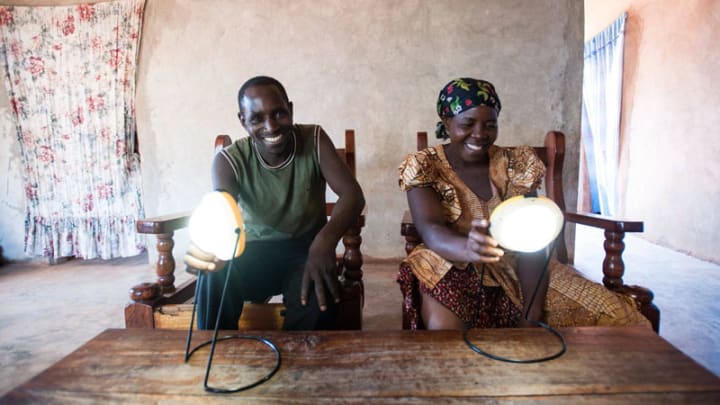
For more than 300 million people in India, sunset brings all economic and social activity to a near standstill. Likewise, more than 600 million people across sub-Saharan Africa lack access to electricity. However, amid this lack of electricity there is a significant market opportunity: The energy market is estimated to be worth $2.2 billion in India and paraffin lamp market is valued at $1 billion in Africa.
Social enterprises, such as Greenlight Planet, are leveraging these opportunities by expanding their business from India into African markets, bringing off-grid, affordable solar electricity to 4 million households in more than 35 countries. Unfortunately, there are few similar examples.
As development practitioners, we are encouraged to think outside the box, to develop innovative solutions that can be piloted and tested with a hope that the new approach will solve our most pressing challenges. In many cases, however, innovative solutions to local problems have already been developed, and often, these solutions are coming from the private sector in the “global south.”
Social enterprises designed by and for developing countries are powerful tools in combating many of the world’s most challenging development issues. Moreover, enterprises that grow while serving the bottom of the pyramid within a developing country can often be successfully adapted and replicated in countries with similar inequalities.
The real challenge facing the development community today is: how do we harness the potential of these proven enterprises and scale them into other developing countries?
Understanding what works
There is a demand for impact-focused businesses in India and Africa, but even with promising transfer potential, enterprises looking to expand into other developing markets face difficult decisions and many unknowns, according to International Finance Corp.’s 2015 “Corridors for Shared Prosperity” report.
Businesses that have shown great resilience to innovate and survive in tough business climates hold the potential to replicate their success in new geographies, but there is a lack of resources available to connect enterprises to industry networks in new geographical regions.
Read related stories:
► The art of the pitch: How startup social enterprises pitch impact investors
► 5 tips for social enterprises looking to scale
► Starting a social enterprise? Here’s how to choose its legal structure
Social enterprises have developed cost-effective solutions that benefit large numbers of underserved individuals, yet, billions of people continue to live in poverty. Although stakeholders have developed tools to help turn new ideas into viable businesses for the development sector, they have been less successful in helping them scale across borders. The magnitude of global poverty requires solutions that can reach billions rather than millions of people. For that to happen, successful solutions from one country must be replicated in other countries.
A large number of enterprises are already exploring markets outside the country where they were founded. These enterprises are driven by a variety of needs, such as expanding market base, accelerating social impact, or increasing revenue.
Over the past five years, international development organizations have established programs aimed at harnessing and encouraging the role of social enterprises in eliminating poverty. But more is needed to ensure that social enterprise solutions created in emerging economies have access to resources, new markets and best practices.
Replicating successful models
Rather than reinventing the wheel, we must create an ecosystem that supports the capacity, funding and partnership needs of enterprises looking to replicate their successful models. This supportive ecosystem cannot require the blind copy and pasting of enterprises.
It must be a dynamic process that provides a framework to assess an enterprise willing to replicate and support for ensuring successful expansion. This includes technical assistance to assess an enterprise’s proven business model, internal capacity, and goals to ensure the readiness to expand into new markets; funding opportunities through capital or grants; and strong partners to offer insight into the local context and culture to help enterprises appropriately adapt their model for new markets.
Facilitating south-south business expansion can ensure that the most impactful solutions reach those individuals in need and prevent entrepreneurs from reinventing the wheel. This strong, facilitative ecosystem can contribute to improving efficiencies, strengthening capacities, and driving cross-border business expansion to create large-scale impact.
Innovation is not always about finding new solutions to social problems; it is about providing a proven solution and an opportunity to thrive in a different context. Development donors and the private sector must work together to create an ecosystem that fosters strong partnerships and builds a multistakeholder approach to identify opportunities and provide technical assistance during expansion.
As the Greenlight Planet example shows, the markets in developing countries are waiting for these solutions to reach them; however, they need help bringing these solutions to their countries. Social enterprises, local markets, and investors are in need of the development community’s expertise to connect these stakeholders and foster an ecosystem where social impact can expand.
By adapting innovative social enterprise models for replication, cross border expansion is a catalyst for delivery of effective and sustainable development solutions. Development donors and practitioners cannot wait on the sidelines for these enterprises’ innovative solutions to become mainstream. We must actively encourage, support, and collaborate with the private sector to replicate and expand these business models so their solutions reach the individuals in need.
Join the Devex community and access more in-depth analysis, breaking news and business advice — and a host of other services — on international development, humanitarian aid and global health.




